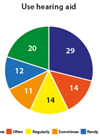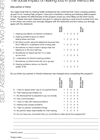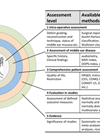Audiology features archive for January 2018
Developing outcome measures for research
There are challenges in developing outcomes measures; Professor Hall presents five top pointers for making rapid progress in developing outcome measures for research purposes. Anyone who has worked clinically with hearing loss will appreciate that every patient’s experience is personal....
Hearing aid outcomes in older adults: what and when to measure
What matters to older adults when purchasing a hearing aid? Larry Humes explores the domains that should be measured for this key group. This article identifies key domains of hearing aid outcome in older adults. Increasingly, third-party payers and private-pay...
The basis of the bargain: outcomes not inputs
There are international drivers focusing our attention on measuring outcomes; Anthony Hogan looks at the data to see how we are currently measuring up. Introduction A global paradigm change is impacting on the provision of disability services. At its heart,...
Measuring client-centred outcomes in audiology: towards a parsimonious solution
From an international driver to the client-centred care model; in this article Anthony Hogan explores outcome measures for individual goal setting and measuring those outcomes. Introduction When people present for hearing help, they are typically looking for solutions to the...
Measuring audiological outcomes in the paediatric setting
In this article Marlene Bagatto argues that a range of outcome measures and instruments need to be implemented when working with children and families. She demonstartes how these support both clinicians and families. The primary goal of early hearing detection...
Health related quality of life measures as outcome parameters in middle ear diseases
Surely the only outcome needed for post-surgical ears is a better PTA? Marcus Neudert argues there should be more to it than that. To draw a comprehensive picture of the disease-associated restrictions in patients with chronic otitis media, audiometric outcome...











